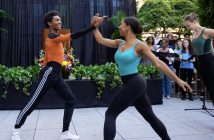
Robert Grimes, S.J., dean of Fordham College at Lincoln Center (left), discusses a research project on near-term birth and disease rates with senior Annika Brown.
Photo by Chris Taggart
Approximately 40 Fordham College at Lincoln Center (FCLC) students took part in the 2007 Research Fair on Nov. 8 during which they displayed the results of their studies and the University honored some of its most accomplished undergraduate researchers.
As part of the fair, students displayed posters of their research, much of it in the natural sciences. The projects ranged from the molecular identification of a gene in the fruit fly and enzyme activity in clams, to how flavonoids in wine, green tea and chocolate help prevent damage to the human retina.
The event also included an awards presentation in which faculty judges honored sophomores Vladimir Tchikrizov and Mohammad Usmani for their work in biology, junior Kerri Reynolds for general chemistry, senior Francesca LaRosa for organic chemistry and junior Alexander Ritter for general physics.
Joan Roberts, Ph.D., professor of chemistry and chair of the Department of Natural Science, said the fair helps promotes Fordham as a place where undergraduate students actively engage in scientific research.
“We’re not here to train technicians,” Roberts said. “Our goal is to have every undergraduate student majoring in a natural science do a research project. If you want to be a scientist, you have to know how to do the research, how to present it as a poster, how to stand up and discuss it and how to write it up as a paper. These are techniques you are never going to learn in a textbook. It’s real science.”
Nationwide, colleges are moving toward having undergraduates engage in research. The National Science Foundation, in fact, awards some $60 million annually to promote such research through its Research Experiences for Undergraduates grant program.
At Fordham, the research fair is in its sixth year, and Roberts said that participation is rising. The department has increased its enrollment by 30 percent in just three years, she said, and is attracting more pre-med and pre-professional students. Funding for the posters this year came from the American Chemical Society, the National Institutes of Health and from Fordham’s own Collegiate Science and Technology Entry Program (C-STEP).
Undergraduate research has multiple values, Roberts said, including offering students a chance to be mentored by professors working on funded projects. Jason Morris, Ph.D., assistant professor in the Department of Natural Science, mentored 10 students on his NIH-funded project on identifying behavior of a gene in the fruit fly.
Morris said his students, who presented three of the posters, helped him analyze data, keep abreast of current literature in the field and even critique experimental design—important skills necessary to the budding scientist.
“For them, the [research]experience can be transformative,” he said. “No student can know from the classroom if they want to choose science. The experience of doing research firsthand helps them discover if it is a career path for them.”
It can also be a steppingstone to graduate school.
Miriam Madry (FCLC ‘06), who returned to Fordham this fall as a post-baccalaureate student to learn biochemical techniques, said that completing an undergraduate research project is becoming a resumé staple.
“For those of us who want to go to medical school,” she said, “You need a research project on a resume to be competitive.”

